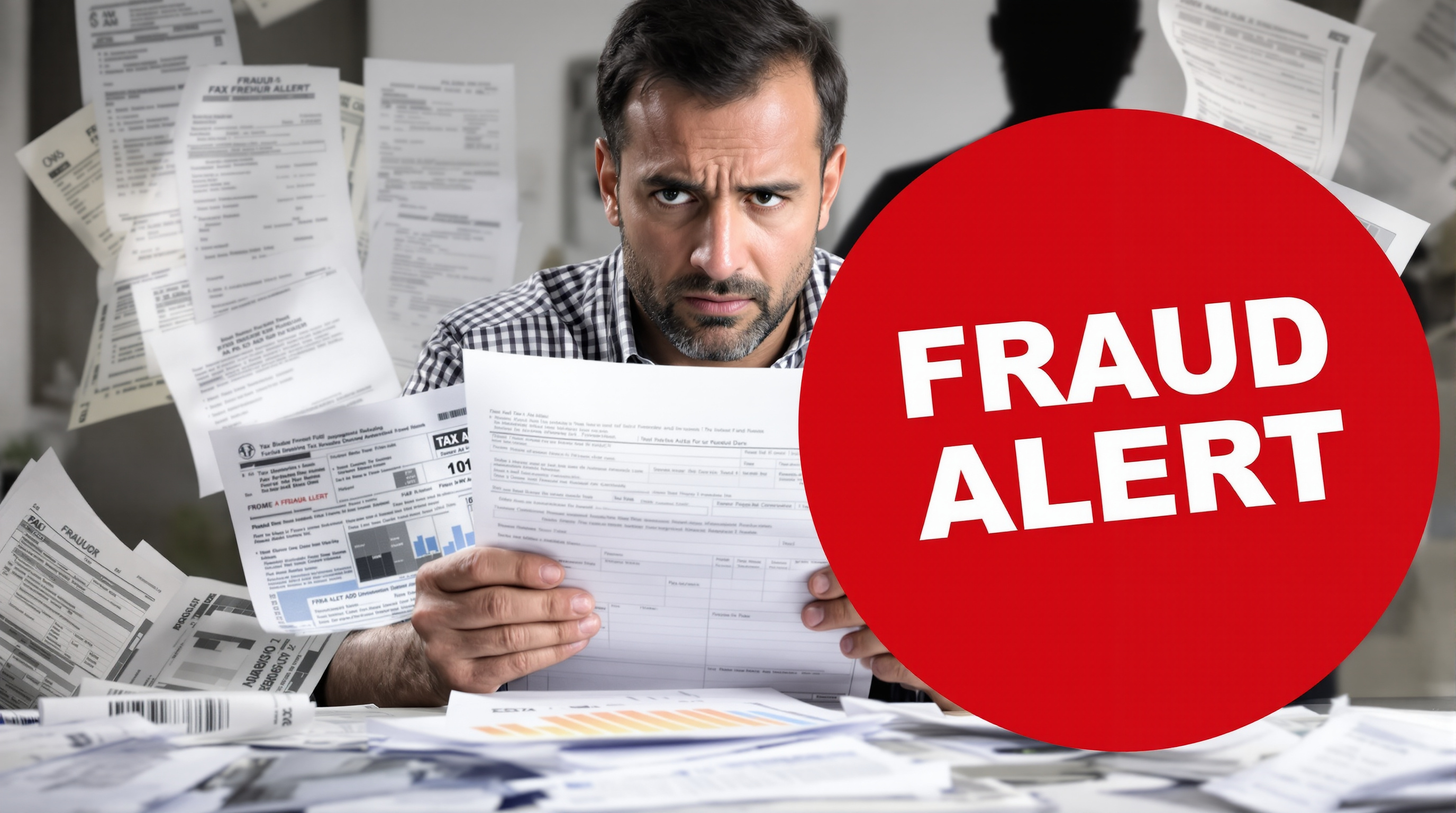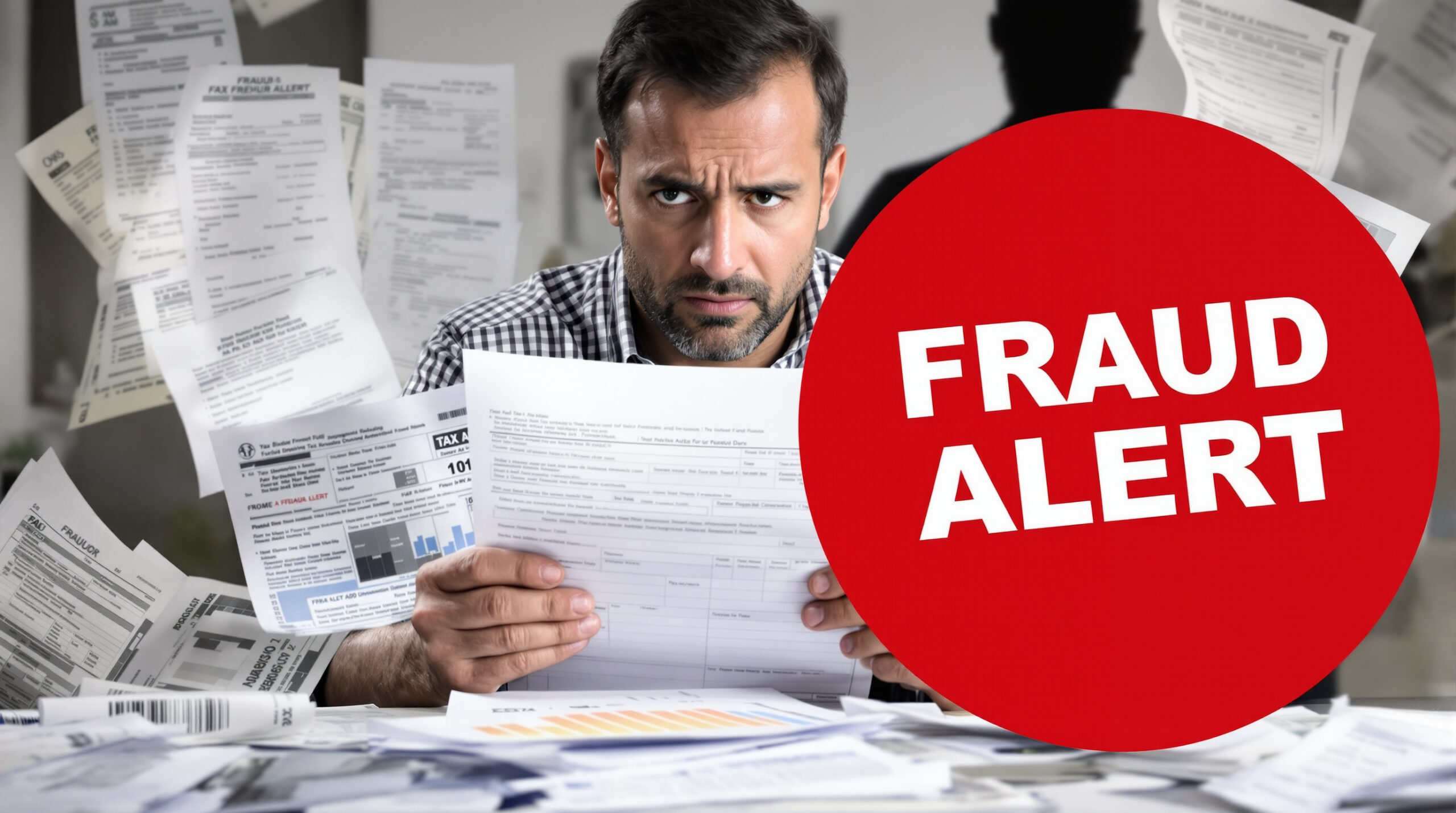Fraud-Proof Your Business: The 2025 Guide to Exposing Tax Preparer Scams
Meta Description: 92% of business owners trust their tax pro. Many shouldn’t. Unmask scam warning signs, cash risks, and deduction traps before your 2025 business tax return gets hijacked.

This is the year you finally outsmart tax fraud—because the average tax scam cost for small businesses topped $8,200 last year, and the next IRS Dirty Dozen crackdown is already underway. Don’t assume your tax preparer is safe just because they come recommended, wear a suit, or quote IRS jargon. Scams are subtle, sophisticated, and increasingly aimed at unsuspecting business owners. If you sign a 1040, S Corp, or LLC return, you must know what fraud looks like—and how to shut it down fast.
The Quick Answer: How to Spot a Bad Tax Preparer—Fast
If your tax pro asks for cash only, refuses to sign your return, or won’t put credentials in writing, run. Licensed preparers operate transparently: they’ll verify their PTIN (Preparer Tax Identification Number), share licensure state bar or CPA numbers, and provide receipts. Anything less is grounds to walk away and report them—before the scam touches your business or the IRS keys you in for an audit.
Red Flag #1: Zero Paper Trail—No Receipts, No Records
It sounds basic, but scam preparers actively avoid proper documentation. Got an invoice scrawled on scratch paper—or nothing at all? That’s your cue to disengage. IRS Publication 1345 requires all authorized e-filers to keep detailed records for every business return. If your ‘expert’ dismisses this as unnecessary, your business is now at risk.
Real business tax return scam prevention starts with internal controls, not after the fact. Every California business should reconcile its e-file acknowledgment directly from the IRS Modernized e-File (MeF) system—never rely solely on a preparer’s confirmation email. The simplest safeguard? Log in to your own IRS account and verify your Form 1120, 1065, or 1040-Schedule C was accepted under your EIN, not someone else’s transmission ID.
For example: California bakery owner Jamie paid a local preparer cash each April, received only text-message ‘receipts,’ and never got a finalized copy of her Form 1120-S. When the FTB audited, she faced $6,100 in back tax penalties—and her preparer was untraceable.
Strategic business tax return scam prevention starts with due diligence before you hand over your financials. Verify your preparer’s e-file authorization in the IRS e-Services system, confirm that their PTIN is active for the 2025 filing season, and require a signed engagement letter before they touch your books. The IRS specifically warns in Publication 4832 that “ghost preparers” use missing signatures and vague invoices to conceal identity and dodge liability—leaving your business exposed during audits.
Can I Deduct Business Expenses If I Never See the Records?
No. If you’re ever questioned, you’ll need backup: receipts, general ledger, or digital banking records. Your preparer should keep and share these—even PDFs count. Without a paper trail, the burden’s on you during an audit.
Red Flag #2: Cash-Only Payments & Untraceable Transactions
IRS scam crackdowns target preparers who avoid traceable payment systems. Anyone demanding cash-only sets off a fraud alarm: you lose all evidence of engagement and open yourself to ‘phantom deduction’ risks. According to the latest IRS warning, legitimate pros offer business checks, cards, ACH, and will issue a receipt matching your name or entity—never an alias.
For W-2 consultants and S Corps: Payment via Venmo labeled “miscellaneous services” is not legitimate documentation. The 2025 tax year sees new 1099-K reporting standards, and mismatches can trigger audits regardless of intent.
Another overlooked layer of business tax return scam prevention is controlling who has access to your EIN and refund routing data. Scam preparers often redirect legitimate business refunds to third-party accounts using stolen or altered direct-deposit fields. Always cross-check the final return before filing—line by line—to confirm your routing and account numbers, EIN, and preparer PTIN. The IRS and FTB will honor the filed data, not your verbal agreement.
Is It Ever Safe to Pay Cash for Tax Prep?
Rarely. Only do so if you get an itemized receipt, clear business info, and a PTIN (look up the PTIN at the IRS directory). When in doubt, insist on a business check or card—always.
Red Flag #3: Questionable Deductions and Overpromising Results
Does your preparer guarantee a huge refund or offer ‘secret’ deductions the IRS won’t catch? Red flag. IRS Publication 470 warns about “preparers scheming clients into false refunds.” They may inflate deductions, invent business expenses, or ignore S Corp/W-2 rules.
Case Example: Marketing consultant Melinda claimed $18,000 in office supplies and travel without receipts, following her preparer’s advice. Result? $12,700 audit adjustment, denied refund, and a flagged IRS account.
💡 Pro Tip: If it sounds too good to be true and you don’t have documentation, expect an audit—and possible fraud penalties. The fraudster walks away; you eat the cost.
What If My Preparer Claims ‘Insider’ IRS Knowledge?
True tax strategists cite official IRS publications or show sample audit letters—not “I know someone at the IRS.” For legal tax-saving moves, ask for the rule number (e.g., IRC 280A, Section 179); if they dodge the question, walk away.
Red Flag #4: Refusing to Sign Returns or Provide PTIN
By law, all paid tax preparers must obtain—and include—their PTIN on any return they file. Unsigned returns or “ghost preparers” are the #1 IRS audit trigger for small business filers. Why? Because these fraudsters leave you holding the bag when the numbers don’t add up.
Example: S Corp owner Eddie’s unsigned 1120S led to IRS correspondence and $3,800 penalties, since his ‘pro’ disappeared.
Where Do I Find a Legit Tax Preparer?
- Verify licensure at the IRS Return Preparer Directory.
- Search for CPA status at your state’s Board of Accountancy or check attorney credentials for an EA (Enrolled Agent).
- Ask for their PTIN up-front. No PTIN = no business.
Red Flag #5: Vague on Credentials or Unwilling to Share Staff Info
A true professional welcomes transparency. Scammers get creative with titles (“Enrolled Tax Consultant,” “Tax Analyst,” “ProAdvisor”) that don’t mean anything. For 2025, the IRS rolled out new credentialing for high-volume preparers—ask for theirs in writing.
- Only a CPA, EA, or attorney can represent you in front of the IRS and FTB
- Always ask if the staff handling your file are supervised
- Never accept “we don’t disclose staff info”—fraudsters hide for a reason
What If My Preparer’s Office is a PO Box or Shared Retail Counter?
No physical business address, just a PO box, mail center, or strip mall with no signage? Treat this as a red flag. The IRS sees untraceable office locations as common fraud patterns—especially in California, Florida, and New York.
Red Flag #6: Refusal to Explain Deductions or Provide Tax Law References
If you ask, “What IRS code supports this deduction?” and get silence, beware. Tax law changes every year, and your pro should cite specific code sections or IRS guidance—especially for big-ticket deductions. With the 2025 tax year’s new reporting rules, ignorance is not an excuse, and vague explanations can cost you thousands.
- Request supporting documentation for all major entries
- Insist on a tax summary or “explanation of benefits” page
- Don’t accept “I’ll explain after the refund arrives”
Can I Trust Online Tax Pros or Remote Filers?
Remote tax pros can be legitimate, but only if they provide clear digital records, secure portals, and full transparency. Never share tax documents over email or social media DMs alone—insist on a secure, encrypted upload process.
Red Flag #7: Direct Line to IRS? That’s a Lie
No accountant, agent, or preparer has a ‘special’ contact at the IRS who processes returns faster or can change a refund decision. These myths are common in scam schemes. The only legitimate line of communication is through standard IRS channels or your own IRS online account. Anyone who claims otherwise is selling snake oil.
How to Report a Suspected Tax Preparer Scam in 2025
- File IRS Form 14157 (find it here) for return preparer fraud.
- Send a separate report to your state tax department (e.g., California FTB).
- Alert the IRS and FTB promptly if you suspect identity theft, especially if you receive mail regarding tax returns you never filed.
Effective business tax return scam prevention goes beyond reporting—it’s about documentation discipline. The IRS recommends retaining at least six years of digital copies for business returns, including engagement letters, signed authorizations (Form 8879), and transmission receipts. These records serve as proof of compliance if a preparer alters, fabricates, or omits key filings. California’s Franchise Tax Board aligns with this timeline, so keeping dual federal and state proof protects both sides of your audit exposure.
Traps Most Business Owners Miss (And How to Defend Yourself)
Trap 1: Letting a preparer withhold your full copy of your tax return “until IRS acceptance”—never allowed. You’re entitled to a full digital/PDF return the moment it’s filed.
Trap 2: Emailing tax docs without encryption. This is a top cause of business identity theft in the IRS annual reports.
Trap 3: Accepting “free” audit defense or refund insurance from your preparer without a contract. The IRS warns these are often meaningless.
This guidance is current as of October 9, 2025. Tax laws change frequently—always verify with the IRS or Franchise Tax Board if reading this at a later date.
Book Your Fraud-Proof Tax Strategy Session
If you’re even slightly unsure about your preparer’s legitimacy, or if you’ve spotted any of these warning signs, book a personalized consultation with a real licensed strategist. We’ll review your business tax history, flag potential issues, and set you up with compliance-safeguarded strategy for 2025. Don’t leave your tax future in the wrong hands—click here to book your fraud-proof tax session now.
FAQ Section
Is paying cash for tax preparation ever safe?
Only if you get a written, detailed receipt and can verify the preparer’s PTIN at the IRS portal first.
What if my preparer refuses to sign my tax return?
Refuse to file. The IRS calls this a “ghost preparer” and will hold you liable for errors or fraud.
How do I report tax preparer fraud?
Complete Form 14157 and file with the IRS, and alert your state tax agency immediately.
Ready for proactive audit defense and a legitimate tax saving plan? Get started with your fraud-proof tax session here.



